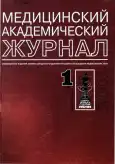Systemic analysis of factors determining blood loss during total hip replacement
- Authors: Kornilov N.V.1, Kustov V.M.1, Avrunin A.S.1
-
Affiliations:
- Vreden Research Institute of Traumatology
- Issue: Vol 1, No 1 (2001)
- Pages: 88-93
- Section: Clinical medicine
- Published: 07.10.2001
- URL: https://journals.eco-vector.com/MAJ/article/view/693527
- ID: 693527
Cite item
Abstract
The authors analyzed intraoperative blood loss volume in 513 patients who had undergone total hip replacement in 1996-1999 for dystrophic-degenerative disease or injury sequels. Its seasonal and weekly changes were evaluated. It was found out that blood loss level depends upon two groups of factors: medical ones and those which are connected with external influences. The lowest "chronorisk" of excessive blood loss was found in July - November, the highest - from January till June (the maximal value being registered in March, and its decrease in May). The analysis of blood loss dynamics for 14 surgical teams demonstrated that 40% of them had the highest value of blood loss only on Thursdays, 30% - on Tuesdays; in 20% of the teams it had in an analogy with the average statistical model two peaks, namely on Thursdays and Tuesdays; and in 10% the peak was on Mondays. Thus, 80% of the surgical teams demonstrated circaseptan (around a week) and 20%- circahemiseptan (around half a week) periodicity of intraoperative blood loss oscillations. Basing on these findings one may assume that the "chronorisk" of excessive intraoperative blood loss increases on Tuesday and Thursday.
Keywords
About the authors
N. V. Kornilov
Vreden Research Institute ofTraumatology
Author for correspondence.
Email: shabanov@mail.rcom.ru
Член-корреспондент РАМН
Russian Federation, St. PetersburgV. M. Kustov
Vreden Research Institute ofTraumatology
Email: shabanov@mail.rcom.ru
Russian Federation, St. Petersburg
A. S. Avrunin
Vreden Research Institute ofTraumatology
Email: shabanov@mail.rcom.ru
Russian Federation, St. Petersburg
References
- Вайнберг Дж., Шумекер Дж. Статистика. Статистика, 1979. 388 с.
- Карп В.П., Катинас Г.С. Основные понятия хронобиологии и хрономедицины // Хронобиология и хрономедицина. М.: Медицина, 1989. С. 17-28.
- Корнилов Н.В., Войтович А.В., Машков В. М. и др. Хирургическое лечение дегенеративнодистрофических поражений тазобедренного сустава. СПб.: ЛИТО Синтез, 1997. 292 с.
- Кустов В.М. Хирургическое лечение дегенеративно-дистрофических заболеваний и повреж дений тазобедренного сустава с использовани ем регионарной анестезии: Дис. .... д-ра мед. наук. СПб., 1997. 328 с.
- Cugini P., Romit A., Di Palma L. et al. Common migraine as a weekly and seasonal headache // Chronobiol Int. 1990. Vol. 7. № 5-6. Р. 467-469.
- De Maio D., Carandente F., Riva C. Evaluation of circadian, circaseptan, and circannual periodicity of attempted suicides // Chronobiologia. 1982. Vol. 9. № 2. P. 185-193.
- Meyer F. de, Vogelaere P. Spectral resolution of cardio-circulatory variations in men measured by autorhythmometry over 2 years // Int. J. Biometeorol. 1990. Vol. 34. № 2. P. 105-121.
- Hildebrandt G. Reactive modifications of the autonomous time structure of biological functions in man // Ann. Ist. Super. Sanita. 1993. Vol. 29. № 4. P. 545-557.
- Nicolau G. Y., Haus E., Popescu M. et al. Circadian, weekly and seasonal variations in cardiac mortality, blood pressure and catecholamine ex retion // Chronobiol. Int. 1991. Vol. 8. № 2. P. 149-159.
- Pasqualetti P., Colantonio R., Casale Acitelli P. et al. The chronobiology of sudden cardiac death. The evidence for a circadian, circaseptimanal and circannual periodicity in its incidence // Minerva Med. 1990. Vol. 81. № 5. Р. 391-398.
- Pasqualetti P., Natali G., Casale R. et al. Epidemiological chronorisk of stroke // Acta Neurol Scand. 1990. Vol. 81. № 1. Р. 71-74.
Supplementary files






